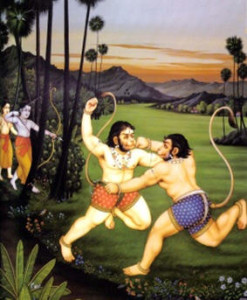Hare Krishna.
December 2012, Gurgaon
After the Sunday Bhagavatam class was over one Prabhuji asked two teaser questions from the devotees; one of the question was why did Lord Rama killed Vali from behind a tree in His pastime in Ramayana.
I knew this particular pastime but this question had never crossed my mind before. I searched for an answer and got it from HG Chaitanaya Charan Prabhuji’s website (www.thespiritualscientist.com/audio/Vali.mp3) . I am sharing the answer in brief below based on the same.
After Vali was hit by an arrow from Lord Rama he angrily asks Lord Rama “I thought you are a virtuous person. How could you have done such a vicious act? I think it is because of your association with this vicious person Sugriva that you have also become spoiled.” Lord Rama smiles and He says, “O Vali, it seems that with the deterioration of the body even the intelligence gets deteriorated. You are accusing me of immorality without understanding the intricacies of dharma.”
Lord Rama first point was “I am the servant of Bharat who is currently the ruler of the world, as a servant of the king and the member of the royal Kshatriya class, it is my duty to protect the virtuous and to punish the unrighteous or the vicious.
Lord said that although there was no fault of Sugriva, you attacked him, insulted him, exiled him and threatened to take his life, you even took up his own wife as your wife. Hence you are an aggressor, an aatatai. Vedic scriptures declare that if any person comes as an aggressor with wicked intentions, he deserves to be killed and there is no sin in killing such a person by whatever means.
Lord Rama added that ” you know you are a monkey and as a hunter can kill animal without necessarily confronting it, a hunter can kill an animal while being in a tree, while being concealed in the bushes, so the Kshatriyas codes allows one to do that. That’s why I have killed you and I have done nothing wrong.”
Lord Rama then added, “O Vali, if you still feel that I have wronged you than I can give you back your life right now.”
When Vali heard all the answers he became purified by the mere presence and voice of the Lord. He realised that he had badly misunderstood Sugriva’s intentions. Vali replied “My dear Lord, I’ll get many lives, but a death like this when will I get again. To die in Your presence is the greatest fortune and it is a perfection of life. I seek only that I can behold Your face and die in your presence.”
Vali, being completely purified, gave his own necklace, which was given to him by Indra, a source of his power, not to his own son, Angada, but to Sugriva. Vali was so convinced and transformed by Lord Rama’s answer that he realized that he has wronged Sugriva and to seek forgiveness from Sugriva, he gave him his own necklace.
Before giving that necklace he told his son, ‘don’t bear any animosity against Sugriva or Rama because they have not killed me. It is my own bad deeds that have caused my death. Please serve Sugriva as you have served me and please serve Lord Rama as The Supreme Lord.’
Vali was convinced and the conviction was demonstrated through his transformation.
Now the question still remains why Lord Rama didn’t kill Vali in a direct battle. He could have. Vali had earlier performed tapasya and got blessings from the demi-gods. He wanted immortality but he could not get it, so, like Hiranyakashipu, he asked immortality in an indirect way by saying that whenever I have to fight with anyone let half of that person’s powers come to me. So this way Vali would always be stronger than any of his opponents. Lord Rama is the supreme Lord, and He could still have killed Vali anyway, but he honored the benedictions of the demi-gods, just as Lord Narsimha Dev came in a special form to kill Hiranyakashipu. Similarly Lord Rama, in order to honor the benediction of the demi-gods, arranged to kill Vali in a way in which he was not facing Him.
How everything becomes clear to us when we see it from the eyes of Guru, Sadhu and Shastra.
All glories to the wonderful pastimes of Lord Sri Rama.
All glories to Srila Prabhupada.

